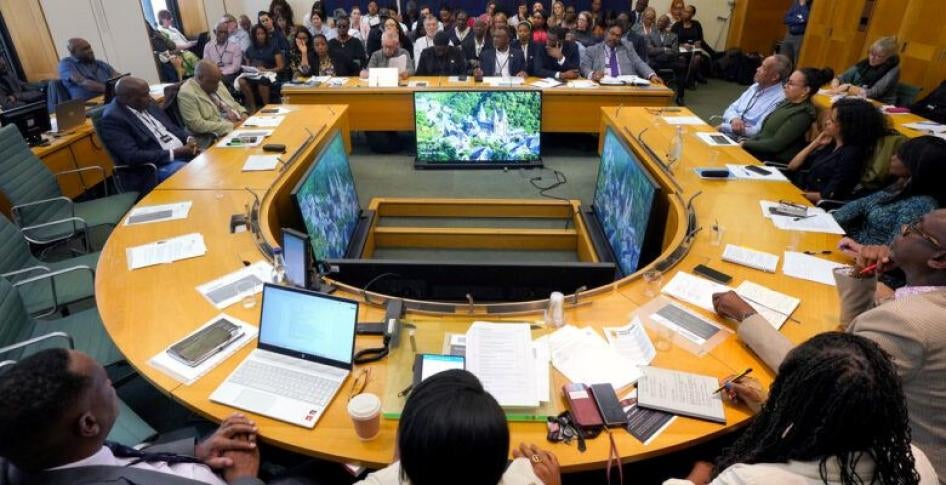That the term “Windrush scandal” has become well-known is a testament to the tireless campaigns to demand justice for the Windrush generation in the UK. As Black Britons from predominantly former British colonies, they were invited by the UK government after 1948 to live and work in the UK after World War II to help rebuild the country and assured that they would be able to remain in the UK. But many years later, their citizenship was questioned, uprooting the lives they had built here.
Five years after the apology by then-Prime Minister Theresa May for the life-altering losses due to the failure of the UK’s Home Office to provide people with the necessary paperwork to prove lawful status in the UK, promises to right these wrongs now ring hollow. People were stripped off their rights, thousands faced unemployment, homelessness, loss of health care, loss of education, inability to access benefits, and even detention and deportation. And yet members and relatives of the Windrush generation are still waiting in vain for fair and adequate compensation for their hardships.
In February and March 2023, Human Rights Watch spoke with over two dozen people about whether the government had learned any lessons to avoid another Windrush-style scandal in the future and the failures to remedy the harm. We spoke with Windrush claimants, their dedicated immigration lawyers, campaigners, racial justice groups, their organizations such as Windrush Lives, members of parliament, academics, and journalists.
The UK government had made, among others, a commitment to compensate people for the losses and impact on their lives. The promises followed an independent inquiry report—the “Windrush Lessons Learned Review.” The report’s author, Wendy Williams, found that UK’s ‘hostile environment’ immigration policy reflected “institutional ignorance and thoughtlessness toward the issue of race and the history of the Windrush generation within [the Home Office…and was] consistent with some elements of the definition of institutional racism.”
The acute, life-altering, and persisting nature of rights abuses ensuing from the “Windrush Compensation Scheme” came through in all of our conversations with the various actors, demonstrating that the UK government continues to fail the Windrush generation. It became quickly clear to us that factors related to independence and transparency around the administration of the scheme by the Home Office—the same government ministry that had committed the wrongs—resulted in people’s distrust in the scheme. Claimants told us that when they applied for compensation, they were not getting the compensation they were owed – and that the compensation process was difficult to navigate without the help of a lawyer.
It is important to stress that Human Rights Watch’s findings reflect those of other campaigners and lawyers. The Home Office’s minor changes to the compensation scheme hadn’t improved the process in ways that would instill trust, provide genuine independent and transparent oversight, make it accessible for all eligible claimants, or guarantee fair compensation at the end of the process.
These findings are also reflected in the January 2023 conclusions of the UN Working Group on People of African Descent that the Windrush generation had suffered “irreparable harm” with redress being “imperative.” They recommended that compensation for Windrush claimants be simple, without complex application and reporting requirements, and with all uncertainty resolved in favor of the claimant. But Human Rights Watch findings show that the contrary is still the case.
A primary concern is that claimants don’t have access to legal aid to access the complex compensation process that requires substantive evidence to prove any hardships incurred as a result of not having the papers to prove lawful status in the UK. Claimants called the scheme “complicated,” a “stressful” process, leaving them exposed to arbitrary decision-making, without the assistance of a lawyer.
The Home Office’s ‘We Are Digital’ service does not provide the same assistance that a lawyer provides to claimants – including legal advice and being able to tell their story to someone who believes and wants to help them. This service should not be considered a substitute for legal aid and in fact imposes another layer of difficulty for those who are not adept at online procedures.
The Home Office imposes an unreasonably high burden of proof on claimants that has made it at times impossible for claimants to provide the kind of evidence demanded and to get compensation for some losses that the Home Office arbitrarily decided fall outside of the scheme. For example, the Home Office has excluded losses to pensions because it deemed the calculations to be too complex.
The appeal process for a negative first decision is equally unsatisfactory. One avenue of appeal remains within the Home Office while the other, through His Majesty’s Revenue and Customs, can only make recommendations to the Home Office. That means claimants are denied meaningful avenues of appeal to address arbitrary decisions. Home Office statistics show that there has been a four-fold increase over the last two years of appeals going to first-level Tier-1 reviews, which indicates dissatisfaction with first determinations.
Human Rights Watch calls for urgent reforms of the scheme to ensure the right to an effective remedy for eligible claimants:
- Legal aid should be guaranteed to all eligible Windrush claimants, which would provide scrutiny over and consistency in the Home Office’s compensation decisions and most likely speed up the compensation process by ensuring more timely processing of applications by the Home Office.
- The Home Office should provide claimants with the right of appeal to an independent and impartial tribunal and make such appeal decisions binding. This is essential to ensure that there is an effective review of decisions.
- The Home Office should lower the burden of proof for claims to ensure that people are compensated fully for their losses and hardships and the impact of the experience on their life regardless of the complexity, including in particular their pension losses.










